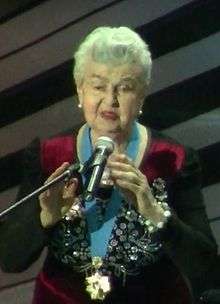Lyudmila Lyadova
Lyudmila Alekseevna Lyadova (Russian: Людмила Алексеевна Лядова; born 29 March 1925) is a Russian composer who lives and works in Moscow.
Lyudmila Lyadova | |
|---|---|
 Lyudmila Lyadova in 2015 | |
| Born | Lyudmila Alekseevna Lyadova March 29, 1925 Sverdlovsk |
| Occupation | composer, singer |
| Years active | 1948-present |
Early life
Lyudmila Lyadova was born in Sverdlovsk into a family of professional musicians. Her father was Alexei Ivanovich Lyadov, a tenor soloist and violinist of the Sverdlovsk Opera Theatre, and her mother was Julia Petrovna Lyadova (1902-1980) who sang with the Sverdlovsk Philharmonic. Lyudmila took private piano lessons as a child, studying with Vanda Bernhard-Trzaska. At the age of 10, she entered the Sverdlovsk Conservatory where she studied with Bertha Marants and Victor Trambitsky. At the age of 14 she made her debut with the Sverdlovsk Philharmonic conducted by Mark Paverman.[1]
Early career
During World War II, Lyadova and her mother became active in concert brigades to entertain the troops, where Lyudmila played and sang popular songs. By November 1943, she had already written a children's miniature on poems by Agniya Barto and Petrovsky and other works including a piano sonata. She appeared in Moscow in a showcase for young talent, and two years later won a performance prize in Moscow for a duet with Nina Panteleeva. The duo went on to tour successfully and participated in variety shows and summer theater.
Career
In February 1951 Lyadova was admitted to the Union of Soviet Composers, and soon afterward the duo broke up as she spent more time working as a composer. She collaborated with poet Georgy Hodosov to produce about one hundred songs, and also worked with poets Sergey Mikhalkov, Yevgeny Yevtushenko, Nikolay Dorizo, Lucia Zubkova, Boris Bryansky, Vladimir Petrov, Tamara Ponomareva and others.
Family life
She married Alexander Fedorovich.[2]
Honors and awards
- People's Artist of the USSR (1985) and the RSFSR
- Honored Art Worker of Russia (1975)
- State Prize of the USSR
- Russian State Prize named after Alexander Vasilyevich Alexandrov
- Lenin Komsomol Prize
- Order For Merit to the Fatherland 3rd class[3]
- Order For Merit to the Fatherland 4th class[4]
- Order of Honour[5]
- Order of Friendship[6]
- Medal "For Distinguished Labour"
- Medal "For the Development of Virgin Lands"
- Honorary citizen of the Sverdlovsk Oblast (2015) [7]
Works
Lyadova is noted for operettas and theater for children.[8] Selected works include:
- Podem (1980)
- Two Colors of Time (1986)
- Under a black mask (1960) [9]
- Atamansha (1972)
- In a dangerous level (1976)
- Who's your bride? (1978)
- Miner's Bride (1983)
- Soul Soldier (libretto by Eugene Shatunovsky, 1962),
- The Tale of Eremu, Daniel and evil forces (1977)
- A Countess from San Francisco (Izhevsk Academic Opera, 1993)
- The Great Battle (lyrics by Vladimir Petrov, 1967)
- Concert Waltz for piano, 1950
- Carousel for piano, 1960
- Concert Polka for piano, 1965
- Concerto for Piano and Orchestra in A minor, 1965
- Intermezzo, Rhapsody, for Russian Folk Instruments
- Kolkhoznaya Polka, 1950
- Ural Rhapsody, 1951
- Volga Suite, 1952
- The Feast of the Volga for orchestra, 1957
- Holiday in the stadium for orchestra, 1958
- Russian souvenir for orchestra, 1961
- Coconuts for orchestra, 1963
- Elegy for violin and piano, 1961
- Blind Girl for violin, 1962
- Fantasy for accordion, 1962
- Negro Doll, ballet
- Spanish Dance, ballet
Her music has been used in films, including:
- It's Impossible Without It, 1971
- Giraffe and the Glasses, 1978[10]
Lyadova has also published a collection of nursery rhymes entitled Pochemuchka.
References
- Sadie, Julie Anne; Samuel, Rhian (1994). The Norton/Grove dictionary of women composers (Digitized online by GoogleBooks). Retrieved 6 January 2011.
- "Lyudmila Liadova". 16 November 2006. Retrieved 6 January 2011.
- Указ Президента Российской Федерации от 8 июня 2005 г. № 660 Archived 2007-05-02 at the Wayback Machine
- Указ Президента Российской Федерации от 17 марта 2000 г. № 523
- "Указ Президента Российской Федерации от 4 мая 2011 г. № 571". Archived from the original on 2015-04-02. Retrieved 2016-02-12.
- Указ Президента Российской Федерации от 2 августа 1997 г. № 818 Archived 2012-07-11 at Archive.today
- Евгений Куйвашев поздравил композитора Людмилу Лядову с присвоением звания «Почётный гражданин Свердловской области»
- Rubin, Don (1994). The World Encyclopedia of Contemporary Theatre: Europe.
- Все материалы о Людмиле Лядовой. (in Russian)
- "Lyudmila Lyadova". Retrieved 6 January 2011.